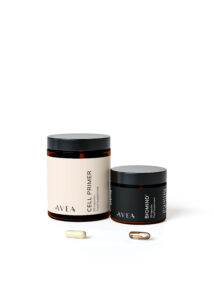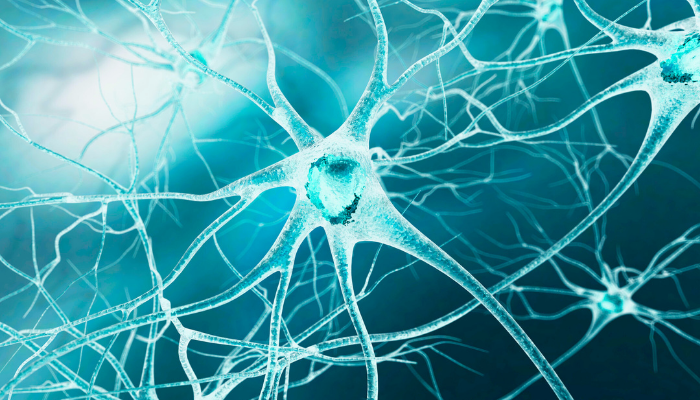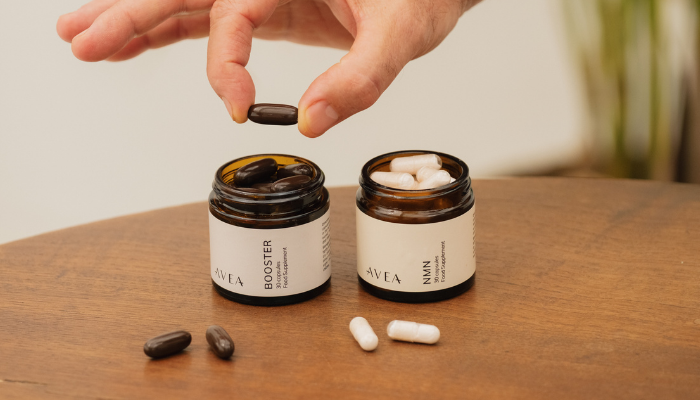As Hippocrates famously said, ‘Let food be thy medicine and medicine be thy food.’ Though ancient, his wisdom still holds true today, especially when it comes to the silent impact of inflammation.
We often don’t recognise the subtle ways our body signals distress until it manifests in fatigue, joint pain, or other discomforts.
One of the key contributors to this silent struggle? Our diet. The foods we consume can either prevent or cause inflammation in your body.
This Avea article provides a list of the top 15 inflammatory foods, and shares signs to look out for after, and if, indulging in them.
Let’s uncover what might be behind your unexplained symptoms.
In this article
Age in reverse with Avea’s FREE guide

- Master the science of rejuvenation.
- Apply proven tips to turn back the clock.
- Transform your health with top longevity specialists.
What is inflammation?
Inflammation is a vital part of our body’s immune response, acting as a defence mechanism when we face injuries, infections, or exposure to harmful substances.
In its simplest form, inflammation is the body’s way of protecting itself. This type of inflammation, known as acute inflammation, is short-term and helps us recover by sending white blood cells to the affected area.
The healing process turns into something more harmful when inflammation becomes chronic, by not subsiding. Chronic inflammation is a low-level, persistent response that can last for months or even years.
Unlike acute inflammation, chronic inflammation might not be as visible, but it can silently contribute to a wide range of health problems, including heart disease, diabetes, and even faster ageing.
One of the main drivers of chronic inflammation is our diet. Whilst some foods can help reduce inflammation, others may encourage it, slowly affecting your body without you even realising.
If you want to continue achieving your dreams as you grow older, you should be aware of the foods that cause inflammation in your body.
Foods that cause inflammation in the body
Food is not just calories; it is information. It talks to your DNA and tells it what to do. The most powerful tool to change your health, environment, and entire world is your fork.” –Dr. Mark Hyman.
Multiple studies reveal the danger of repeat offenders—foods you might unknowingly consume daily.
That breakfast cereal to that mid-afternoon snack, many seemingly innocent items could be quietly fuelling inflammation in your body.
So, let’s cut to the chase: Have you been feeling sluggish? Bloated? Or dealing with unexplained aches?
Then, it might be time to look at your plate.
Here’s a list of the foods that may trigger inflammation in your body:
- Refined sugars – Found in sweets, soft drinks, and processed snacks. Consuming too much sugar is a fast track to spiking blood sugar levels. Common examples include sweetened cereals, fruit juices, and granola bars.
More than 90% of us suffer from excess glucose in our system.’’—Glucose Goddess.
- Refined carbohydrates – White bread, pastries, and pasta might be comforting, but they lack essential nutrients and can also send your blood sugar on a rollercoaster. Examples include white toast, croissants, and bagels.
Discover how White Mulberry Leaf Extract can reduce blood sugar spikes by 40%, even after eating a heavy meal.
- Fried foods – Most of us love golden, crispy foods. But unfortunately, they are full of trans fats. Unlike Omega-3 fatty acids, which are the good types of fats, trans fats lower good cholesterol and increase inflammatory responses in your arteries.
- Processed meats – Bacon, sausages, and deli meats? They might be easy to cook, but they are all loaded with preservatives and unhealthy fats.
- Margarine and shortening – Substituting butter with margarine might not be a smart move after all. They contain trans fats that have been directly linked to inflammation.
- Dairy products – For some, dairy can be the root cause of inflammation, especially if lactose intolerance or sensitivity to dairy proteins is involved.
- Red meat – Regularly consuming red meat, especially processed versions, can lead to increased inflammation due to its high saturated fat content.
- Sugary beverages – Why do you think sugar beverages are common across the world? It’s because they can be addictive.
The high sugar content triggers a dopamine release in the brain, giving you a temporary ‘feel-good’ boost, but leading to cravings for more. Over time, this can contribute to insulin resistance and chronic inflammation.
- Alcohol – Drinking alcohol has 0 positive effects on your body. Forget about this wine and Resveratrol story. Regular consumption of alcohol can lead to liver inflammation, increased oxidative stress, and a weakened immune system, making your body more susceptible to chronic diseases.
- Highly processed foods – Those ready-to-eat meals and snacks might save you time, but they’re loaded with additives, refined sugars, and unhealthy fats that contribute to inflammation. Instant noodles, microwave-ready meals, and crisps are often culprits.
- Artificial sweeteners – ‘Diet’ products might sound better, but artificial sweeteners can upset your gut microbiome and contribute to inflammation in some individuals.
For instance, a study found that common alternatives, when consumed for as little as two weeks, affect intestinal bacterial communities. Some reduced the body’s ability to regulate blood glucose levels.
- Trans fats – These are the bad type of fasts. Found in fast food, pastries, and many processed snacks, trans fats are notorious for causing inflammation and other health risks.
- Excessive salt – High levels of sodium, particularly from processed foods, can trigger water retention and inflammation, especially in people sensitive to salt.
- Corn syrup – Often hiding in processed sweets and snacks, corn syrup is high in fructose.
Fructose is metabolised primarily in the liver, and excessive consumption can lead to fat buildup, liver inflammation, and an increased risk of non-alcoholic fatty liver disease. It may also contribute to obesity, insulin resistance, and chronic inflammation in the body.
- Gluten – Whilst gluten isn’t a trigger for everyone, for those with sensitivity or coeliac disease, it can lead to severe inflammation, particularly in the digestive system.
In the modern world, it might be hard to be able to eat healthy foods every day. You might have to attend that office lunch or indulge at a dinner party. Sometimes you are just tired or are sick, and want to order in.
Still, it’s the daily habits that matter most—your usual breakfast, lunches, and dinners play a much bigger role than the occasional indulgence.
Small changes can make a big difference in how you feel and how your body responds over time.
Here’s a tip.
As a general rule of thumb: if something comes in a package with more than five ingredients—especially ones you can’t pronounce—it’s probably too processed and best avoided for the sake of reducing inflammation.
Want more tips? Discover the top 10 glucose goddess hacks.
Why do these foods cause inflammation?
Inflammatory foods share common characteristics: they’re often overprocessed, high in unhealthy fats, sugars, and artificial additives.
But how do these foods disrupt your body’s balance? By creating chaos at the cellular level, quite literally.
Here are a few mechanisms how certain foods may trigger inflammation in your body:
- Refined sugars and carbohydrates:
Consuming refined sugars spikes your blood sugar levels, causing your body to release large amounts of insulin.
Over time, this can lead to insulin resistance, which is a key driver of chronic inflammation.
Excess glucose in the bloodstream triggers the production of advanced glycation end products (AGEs), which cause oxidative stress and inflammation at the cellular level.
This persistent oxidative stress damages cells and tissues, contributing to diseases like diabetes and heart disease.
Discover how to build an insulin resistance diet here.
- Trans fats:
Found in fried and processed foods, trans fats not only lower HDL (the good cholesterol), but also promote arterial inflammation.
They increase the production of pro-inflammatory cytokines, which causes your immune system to overreact, attacking healthy cells in the process.
Over time, this can lead to atherosclerosis (hardening of the arteries), which increases the risk of heart disease and stroke.
- Preservatives and additives:
Chemicals like nitrates, found in processed meats, increase oxidative stress by producing free radicals.
These free radicals are the bad guys, damaging everything they touch, including cells and DNA.
Long-term exposure to such chemicals can disrupt immune function and increase the risk of diseases such as cancer.
- Alcohol and excess salt:
Excessive alcohol consumption strains the liver, where detoxification occurs. When your liver is overburdened, toxins accumulate, leading to inflammation.
High salt intake, on the other hand, promotes water retention and increases blood pressure. This aggravates inflammatory responses and can worsen autoimmune conditions.
All these disrupt normal cellular function and communication. Over time, inflammation damages tissues, accelerates ageing, and increases the risk of chronic diseases.
In fact, chronic inflammation is now recognised as one of the 12 hallmarks of ageing, shortening telomeres (the protective caps on your DNA) and impairing cellular repair mechanisms.
Simply put, inflammation works against longevity.
What are the health risks of inflammatory foods?
How serious is chronic inflammation, really? The truth is, most people don’t even notice the subtle signals their body sends after consuming inflammation-promoting foods. Likely due to the pervasive food culture in media.
But, over time, this underlying inflammation can lead to persistent symptoms like:
- Constant fatigue
- Recurrent infections
- Aches in joints and muscles
- Trouble sleeping
- Digestive problems such as acid reflux or diarrhoea
- Mental health struggles like anxiety or depression
If left unchecked, inflammation and oxidative stress can pave the way to more severe conditions, including:
- High blood pressure
- Diabetes
- Heart disease
- Cancers
- Liver and kidney diseases
This is why professionals advocate for an antioxidant-rich, anti-inflammatory diet to protect your long-term health. Discover the top 10 tips to build a longevity diet.
How to reduce inflammation in the body
Chronic inflammation may seem overwhelming, but the solution often lies in everyday choices.
Reducing inflammation starts with simple dietary changes:
- opting for whole, unprocessed foods
- increasing antioxidant-rich fruits and vegetables
- cutting back on sugars and unhealthy fats
Besides, countless studies prove the benefits of regular exercising, stress management, and adequate sleep in keeping inflammation in check.
Alongside lifestyle changes, targeted longevity supplements can provide extra support in your fight against inflammation.
These anti-inflammatory supplements work at the cellular level to enhance your body’s natural defences.
Consider anti-inflammatory supplements
Incorporating longevity supplements can be a powerful way to combat chronic inflammation. Avea’s Inflammaging Routine is a carefully designed duo to help you address the root cause of ageing—chronic inflammation.
Avea’s Inflammaging Routine

- Reduces inflammation.
- Boosts mitochondrial function.
- Enhances metabolic flexibility.
- Supports brain health.
The routine includes:
- Biomind: A next-gen probiotic that supports gut microbiome balance, reducing systemic inflammation.
- Cell Primer: Contains senolytics and antioxidants to clear senescent cells, promote autophagy, and enhance mitochondrial health.
Remember, supplements should be used to support—not replace—balanced nutrition and lifestyle choices.













